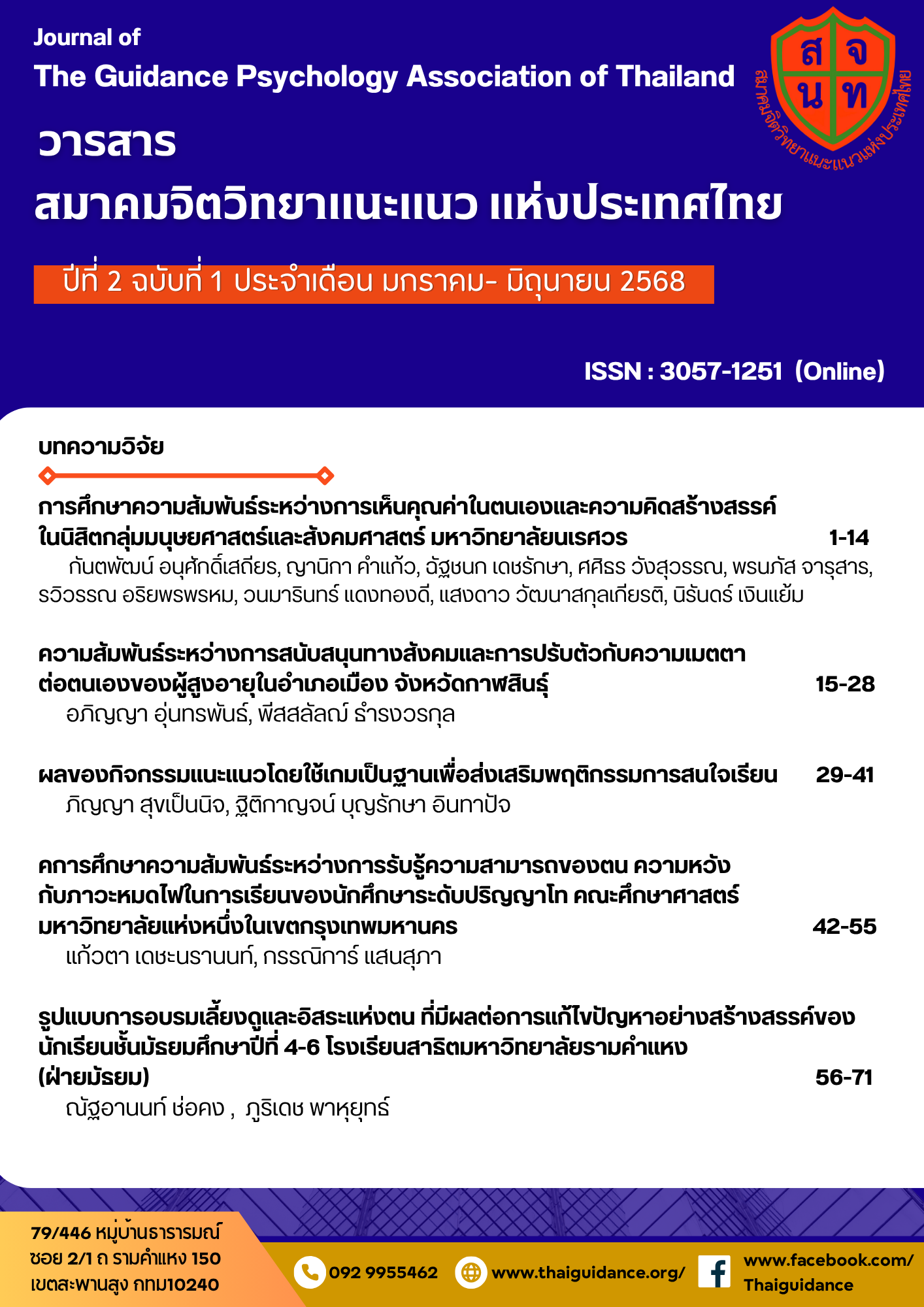A Study of the Relationship between Self-Efficacy, Hope, and Academic Burnout in Faculty of Master's Degree Students, A University in Bangkok
Keywords:
การรับรู้ความสามารถของตน, ความหวัง, ภาวะหมดไฟในการเรียนAbstract
The objectives of this research were: 1) examine self-efficacy, hope, and academic burnout among master's degree students in the Faculty of Education at a university in Bangkok, and 2) to examine the factors related to self-efficacy, hope, and academic burnout among master's degree students in the Faculty of Education at a university in Bangkok. The sample consisted of 260 master's degree students from Faculty of Education at a university in Bangkok during the 2024 of academic year. Research instruments included a demographic questionnaire, an academic self-efficacy scale, a hope scale, and an academic burnout scale. Data were analyzed using descriptive statistics, including frequency, percentage, mean, and standard deviation. Pearson’s correlation coefficient was used to test the hypotheses. The results showed: The overall self-efficacy of academic ability was at a high level (M = 3.45, S.D. = 0.54), hope was also at a high level (M = 3.41, S.D. = 0.40), and academic burnout was at a moderate level (M = 1.64, S.D. = 0.52). The analysis of the relationships between self-efficacy of academic ability, hope, and academic burnout revealed that: (1) Overall self-efficacy had a significant negative correlation with academic burnout (r = -.705), at a high level. (2) Overall hope had a significant negative relationship with academic burnout (r = -.780), at a high level, with statistical significance at the .01 level. (3) Goal-oriented hope had a negative correlation with emotional exhaustion (r = -.682), depersonalization (r = -.662), and academic inefficacy (r = -.632), at a moderate level. (4) Agency thinking had a negative correlation with emotional exhaustion (r = -.681), depersonalization (r = -.660), and academic inefficacy (r = -.650). (5) Pathways thinking had a negative correlation with emotional exhaustion (r = -.681), depersonalization (r = -.660), and and academic inefficacy (r = -.658). (6) Self-efficacy had a significant positive correlation with overall hope (r = .894), at a high level, with statistical significance at the .01 level.
Keywords: self-efficacy, hope, academic burnout
References
เอกสารอ้างอิง
กรรณิการ์ แสนสุภา. (2566). ปัจจัยที่ส่งผลต่อภาวะหมดไฟในการเรียนของนักศึกษา คณะศึกษาศาสตร์
มหาวิทยาลัยรามคำแหง. มหาวิทยาลัยรามคำแหง.
จันทรรัตน์ สิทธิวรนันท์. (2567). ระดับภาวะหมดไฟและปัจจัยที่มีความสัมพันธ์กับภาวะหมดไฟในนิสิตเภสัช
ศาสตร์. Thai Journal of Pharmacy Practice, 16(1), Jan-Mar.
นราพร หริมเจริญ. (2563). การเสริมสร้างความหวังทางการศึกษาของนักเรียนระดับชั้นมัธยมศึกษาตอน
ปลาย. ปริญญานิพนธ์ศึกษาศาสตร์ มหาวิทยาลัยศรีนครินทรวิโรฒ.
เบญจวรรณ ชุนฤทธิ์. (2559). การรับรู้ความสามารถของตนเองด้านการเรียนของนักศึกษาหลักสูตร
คอมพิวเตอร์ธุรกิจ มหาวิทยาลัยสวนดุสิต ศูนย์การศึกษานอกที่ตั้งตรัง. การประชุมหาดใหญ่วาการ
ระดับชาติและนานาชาติ ครั้งที่ 7 23 มิถุนายน 2559, มหาวิทยาลัยหาดใหญ่
ปิยพัฒน์ วงศ์สินอุดม. (2557). ความหวัง การมองโลกในแง่ดี การเผชิญปัญหา และความวิตกกังวลของ
ผู้สูงอายุที่มีความเจ็บป่วย. วิทยานิพนธ์ศิลปศาสตรมหาบัณฑิต, จุฬาลงกรณ์มหาวิทยาลัย.
รพีกรณ์ เปี่ยมพืช. (2566). ปัจจัยที่เกี่ยวข้องกับภาวะหมดไฟทางการเรียนของนักศึกษาระดับปริญญาตรี
มหาวิทยาลัยรามคำแหง ภายใต้การดำเนินชีวิตในยุควิถีใหม่. วารสารจิตวิทยาคลินิกไทย, 54(3), 123-24.
วิลาวัณย์ วรศรีหิรัญ, (2536). ความเครียดของนิสตปริญญาโท สาขาวิชาเอกจิตวิทยาการแนะแนว ปีการศึกษา
วิทยานิพนธสาขาจิตวิทยากรแนะนแว, มหาวิทยาลัยนเรศวร.
อุบลรัตน์ เพ็งสถิต. (2543). จิตวิทยาผู้สูงอายุ. กรุงเทพฯ: สำนักพิมพ์มหาวิทยาลัยรามคำแหง.
Bandura, Albert. (1977). Self-efficacy: Toward a unifying theory of behavior. Psychological
Review. 84(2), 191-215.
Bandura, Albert. (2001). Social Cognitive Theory: An Agentic Perspective. Annu. Rev.Psychol.
Cochran, W.G. (1977). Wiley: Sampling Techniques. 3rd ed. New York: John Wiley & Sons.
Robert V. Krejcie & Earyle W. Morgan. (1970). Determining Sample Size for Research Activities.
Educational and Psychological Measurement, 30 (3), 607-610.
Maslach C, Jackson SE. (1986). Manual of the Maslach burnout inventory. 2nd ed. CA:
Consulting Psycholo- gists Press.
Snyder, C. R. (1991). Hope theory: Rainbows in the mind. Psychological inquiry. 13(4), 249-
Downloads
Published
How to Cite
Issue
Section
License
Copyright (c) 2025 (The Guidance Psychology Association of Thailand

This work is licensed under a Creative Commons Attribution-NonCommercial-NoDerivatives 4.0 International License.
บทความที่ได้รับการตีพิมพ์เป็นลิขสิทธิ์ของ สมาคมจิตวิทยาแนะแนวแห่งประเทศไทย
ข้อความที่ปรากฏในบทความแต่ละเรื่องในวารสารวิชาการเล่มนี้เป็นความคิดเห็นส่วนตัวของผู้เขียนแต่ละท่านไม่เกี่ยวข้องกับสมาคมจิตวิทยาแนะแนวแห่งประเทศไทย และบุคลากรท่านอื่น ๆ ใน สมาคมฯ แต่อย่างใด ความรับผิดชอบองค์ประกอบทั้งหมดของบทความแต่ละเรื่องเป็นของผู้เขียนแต่ละท่าน หากมีความผิดพลาดใดๆ ผู้เขียนแต่ละท่านจะรับผิดชอบบทความของตนเองแต่ผู้เดียว



